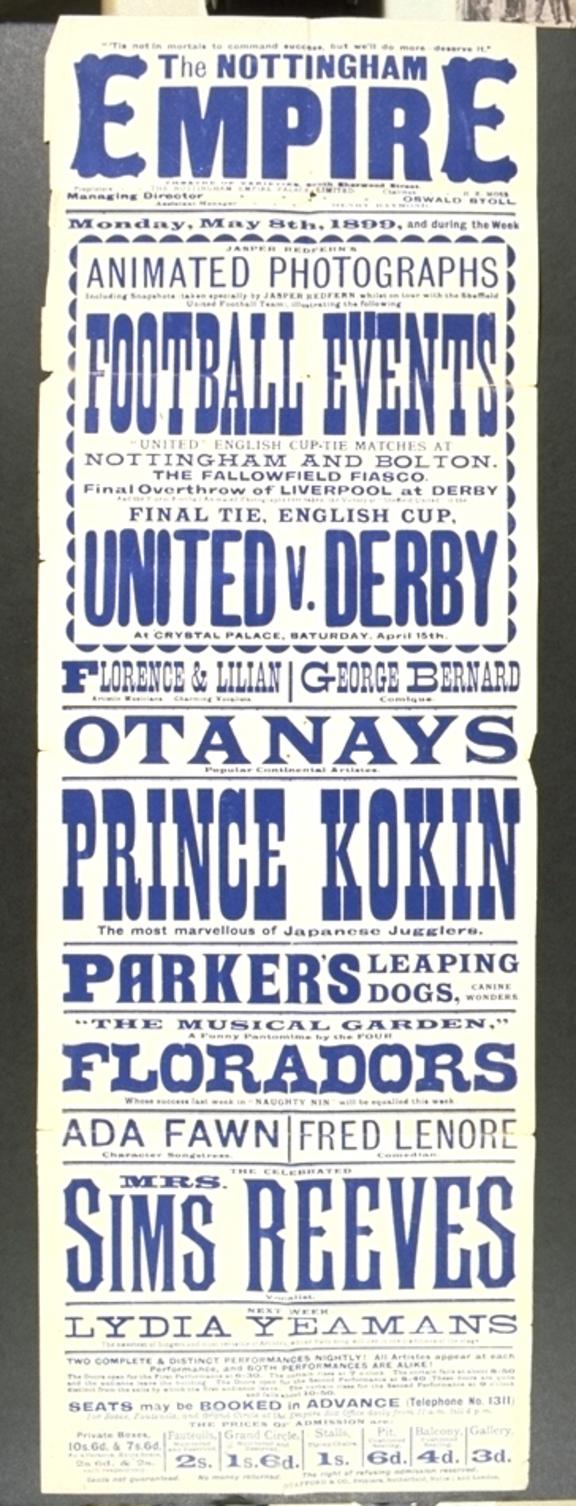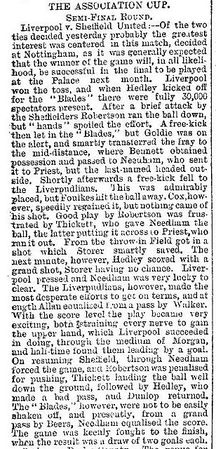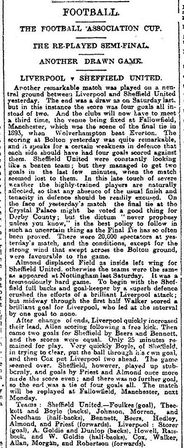Liverpool vs Sheffield United (lost footage of FA Cup Semi-Final matches; 1899)
Between 18th to 30th March 1899, Liverpool and Sheffield United competed in four FA Cup Semi-Final matches to determine who would face Derby County at the 1899 FA Cup Final. After the first two matches ended in draws, and another was abandoned, Sheffield would ultimately advance after beating Liverpool 1-0 at the Baseball Ground. The matches were partially filmed by Henry Jasper Redfern, becoming some of the earliest recorded FA Cup matches.
Background
Liverpool and Sheffield United, as Football League First Division members, entered the tournament in the First Round Proper.[1][2] Liverpool's campaign to the Semi-Finals consisted of it overcoming Blackburn Rovers, Newcastle United, and West Bromwich Albion.[2] Meanwhile, Sheffield United's road to the Semi-Finals saw it defeat Burnley, Preston North End, and Nottingham Forrest.[2] Neither side had previously reached the Final.[3][4]
A year prior, Sheffield optician Henry Jasper Redfern had begun associating with the filmmaking industry, providing Lumière Cinématographe exhibitions.[5][6][7] Utilising a stereoscopic camera, Redfern filmed events within Sheffield, including local cricket games.[7][5] The camera essentially showcased "animated photographs", where it captured several photographs in short order that would be combined to animate the action.[7] In 1899, he travelled with the Blades to witness and record what would eventually be four Liverpool encounters at neutral venues.[8][5] When Sheffield eventually advanced to the Final, Redfern would then travel to the Crystal Palace to capture footage of the 1899 FA Cup Final, making it the second Final to be filmed after 1898.[5][7][8] The five matches were showcased in a film entitled Football Events from 8th May 1899.[9][6][5]
The Matches
The original encounter occurred at the City Ground in Nottingham on 18th March in front of 35,000.[10][11] The Blades started strongly, taking the lead after a goal from George Hedley, capitalising when Liverpool goalkeeper Harry Storer rebounded an earlier shot and was out of position.[10] However, Liverpool fought back with some strong chances, eventually equalising when a pass from Johnny Walker reached George Allan, enabling the latter to score.[10] Liverpool furthered their comeback, capitalising on an awarded free kick that enabled Hugh Morgan to make it 2-1 after 30 minutes.[10] Sheffield began the second-half chasing the game, almost equalising when a shot ended up causing a kerfuffle at the Liverpool goal, eventually being cleared by Allan.[10] A fast-paced game ultimately paid dividends for Sheffield, a 70-minute header from Ernest Needham levelling the game.[10] Sheffield continued to press-on, troubling the tiring Liverpool defence. However, they failed to secure the winner, with Liverpool's Tommy Robertson unable to capitalise on a counter-attack.[10][11]
Thus, a replay commenced at Burnden Park in Bolton on 23rd March, with around 20,000 in attendance.[12][11] Initially, Sheffield's defence were able to prevent an extensive Liverpool charge.[12] However, Walker took the lead for Liverpool after 20 minutes.[12] Liverpool doubled their lead in the second-half via an Allan free-kick.[12] Sheffield however launched a comeback, levelling the game thanks to goals from Billy Beer and Walter Bennett in the 54th and 65th minutes respectively.[12] With 25 minutes remaining, the Blades suffered a setback when a botched clearance from Peter Boyle caused him to score an own-goal in the 70th minute.[12] Two minutes later, Allan missed a penalty, but Jack Cox was present to double Liverpool's lead.[12] But just when it seemed the Reds were on-course for their first FA Cup Final, goals in the 84th and 85th minutes by Fred Priest and Jack Almond suddenly made the score 4-4.[12] Blame was centred upon Liverpool goalkeeper Storer, with The Manchester Evening News stating he "gave a rather sorry exhibition at Burnden Park, and almost the entire blame of the failure on Thursday has been made his burden... There is no doubt he was seriously at fault in his guardianship of the goal and a great deal of the criticism he was subject to was not altogether too severe."[12] Ultimately, neither side broke the new deadlock, and a second replay was scheduled.[12][11]
It was decided the third match would occur at the Fallowfield Stadium in Manchester.[13][11] Fallowfield had previously hosted the 1893 FA Cup Final between Everton and Wolverhampton Wanderers.[14][13] The Final, won by Wolves 1-0, became infamous for a major crowd overflow.[13] The stadium was said to have a capacity of around 15,000, but at least 45,000 were in-attendance that day, with some reports claiming it was closer to 60,000.[13] With fans frustrated and keen to properly view the game, it ended up causing the crowd to fall onto the playing surface.[13] It eventually got out of hand to the point where only the middle of the pitch was utilised for the Final's remaining duration.[13] Post-match, Everton demanded a re-match citing the crowd issues, but this was rejected.[13] On 27th March, Liverpool and Sheffield played at the ground, with the Reds taking the lead prior to half-time.[13][11] However, the match was then abandoned, as a major overflow of fans led to a human crush with the crowd again entering the pitch.[13][11] It is unclear if anyone was seriously injured in said crush, but Fallowfield was never chosen to host a major football match again.[13]
The final replay commenced on 30th March at Derby's Baseball Ground, with around 20,000 in attendance.[15][11] The first-half was evenly matched, with chances missed by both teams, Liverpool's forward noted by the Dundee Courier and Argus as being unsettled near-goal.[15] Sheffield meanwhile had two near-misses, a shot from Beer saved by replacement Liverpool goalkeeper Matt McQueen, and a chance from Bennett hitting the bar.[15] The second-half was slower-paced, but Sheffield again nearly took the lead after a Priest header ended up just wide of the goal.[15] Eventually, the Blades achieved a breakthrough, courtesy of an 85th minute goal from Beer.[15] Liverpool were unable to respond, enabling Sheffield to finally progress to the Final.[15][11] Post-match, William Goldie was suspended for three matches for "discourteous language", while Alex Raisbeck and Walker were reprimanded by the referee for not revealing Goldie was responsible for the language.[15] At the Final, Sheffield defeated Derby 4-1 to claim its first of four FA Cups.[16][4][11] For Liverpool, its first FA Cup would come in 1965 after defeating Leeds United 2-1.[17][3]
Availability
Ultimately, alongside Redfern's footage of the 1899 FA Cup Final, none of the Liverpool-Sheffield United recordings are known to have survived.[18] The earliest recording of an FA Cup Final was in 1901 between Sheffield and Tottenham Hotspur.[18] Nevertheless, newspaper clippings helped to document the matches themselves.[10][12][15]
Gallery
Images
Video
See Also
- 1899 FA Cup Final (lost footage of football match; 1899)
- 1937 FA Cup Final (partially found footage of football match; 1937)
- 1938 FA Cup Final (partially found footage of football match; 1938)
- 1939 FA Cup Final (partially found footage of football match; 1939)
- 1947 FA Cup Final (partially found footage of football match; 1947)
- 1948 FA Cup Final (partially found footage of football match; 1948)
- 1948 Summer Olympics (partially found television coverage of London Games; 1948)
- 1949 FA Cup Final (partially found footage of football match; 1949)
- 1950 FA Cup Final (partially found footage of football match; 1950)
- 1951 FA Cup Final (partially found footage of football match; 1951)
- 1952 Coupe de France Final (partially found footage of football match; 1952)
- 1955 Scottish Cup Final (partially found footage of football match; 1955)
- 1956 Southern Junior Floodlight Cup Final (lost footage of football match; 1956)
- 1966 FIFA World Cup Final (partially found original colour film of international football match; 1966)
- 1967 FA Cup Final (partially found footage of football match; 1967)
- 1968 Football League Cup Final (partially found footage of football match; 1968)
- 1970 FA Cup Final Replay (partially found original ITV coverage of football match; 1970)
- 1971 WFA Cup Final (partially found footage of football match; 1971)
- 1973 WFA Cup Final (lost footage of football match; 1973)
- 1974 WFA Cup Final (lost footage of football match; 1974)
- 1976 WFA Cup Final (partially found footage of football match; 1976)
- 1977 WFA Cup Final (lost footage of football match; 1977)
- 1978 WFA Cup Final (lost footage of football match; 1978)
- 1979 WFA Cup Final (lost footage of football match; 1979)
- 1980 WFA Cup Final (lost footage of football match; 1980)
- 1981 WFA Cup Final (lost footage of football match; 1981)
- 1982 WFA Cup Final (lost footage of football match; 1982)
- 1985-1986 WFA Cup (lost list of entries for football tournament; 1985)
- A Football Match at Newcastle-on-Tyne (lost footage of football match; 1896)
- Arsenal 1-1 Sheffield United (lost radio commentary of football match; 1927)
- Arsenal 7-1 Hibernian (lost footage of charity football match; 1952)
- Arsenal vs Arsenal Reserves (lost footage of early BBC televised football match; 1937)
- Atlético Madrid 1-1 Real Madrid (lost footage of El Derbi Madrileño La Liga football match; 1958)
- Barbados 4–2 Grenada (partially found soccer match footage; 1994)
- Barnet 3-2 Wealdstone (lost footage of Athenian League football match; 1946)
- Bedford Town 1-2 Arsenal (partially found footage of FA Cup match; 1956)
- Blackpool 0-1 Bolton Wanderers (lost footage of Football League First Division match; 1960)
- Brian Clough's Football Fortunes (lost DOS port of football management game; 1987)
- Carlisle United 2-1 Plymouth Argyle (partially found footage of Football League Third Division match; 1999)
- Charlton Athletic 1-0 Blackburn Rovers (lost footage of FA Cup match; 1947)
- Chelsea 1-1 Burnley (partially found footage of FA Cup match; 1956)
- Chelsea 2-0 Sparta Prague (lost footage of international football match; 1957)
- England 0-1 Scotland (partially found footage of international football match; 1938)
- England 1-0 Scotland (lost footage of Schools' International football match; 1952)
- England 1-1 Scotland (partially found footage of international football match; 1947)
- England 1-3 Scotland (partially found footage of international football match; 1949)
- England 2-0 Italy (partially found footage of international football match; 1949)
- England 3-0 France (partially found footage of international football match; 1947)
- England 3-0 Rest of Europe (partially found footage of international football match; 1938)
- England 6-0 Switzerland (partially found footage of international football match; 1948)
- Falkirk 3-2 Newcastle United (lost footage of football match; 1953)
- FIFA Soccer 2002 (lost build of cancelled Game Boy Advance port of football game; existence unconfirmed; 2001-2002)
- France 3-1 West Germany (partially found footage of international football match; 1952)
- France 6-3 Belgium (partially found footage of FIFA World Cup qualifying match; 1956)
- Hallo! Bundesliga (lost GolTV series; mid 2000s-mid 2010s)
- Hero to Zero (partially found BBC One children's football drama show; 2000)
- Juventus 1-7 A.C. Milan (partially found footage of Serie A football match; 1950)
- Lowestoft Town 3-0 AFC Hornchurch (partially found footage of Isthmian League Premier Division play-off final; 2014)
- Manchester United Championship Soccer (lost build of cancelled Sega Mega Drive port of football game; 1995)
- National Professional Soccer League (partially found footage of soccer matches; 1967)
- Netherlands 0-0 Sweden (lost footage of international football match; 1952)
- Premier League All Stars (partially found Sky One charity football tournament; 2007)
- PSV Eindhoven 2-1 E.V.V. Eindhoven (lost footage of Netherlands Football League Championship match; 1950)
- Real Madrid 1-0 Barcelona (partially found footage of El Clásico La Liga football match; 1959)
- Real Madrid 3-0 Racing Santander (lost footage of La Liga football match; 1954)
- San Lorenzo de Almagro 1-1 River Plate (lost footage of Argentine Primera División football match; 1951)
- Scottish Universities 1-1 English Universities (lost footage of international football match; 1952)
- Serbia vs Albania (found footage of abandoned UEFA Euro 2016 qualifying match; 2014)
- Stade de Reims 2-1 FC Metz (partially found footage of French Division 1 football match; 1956)
- United! (lost British soap opera; 1965-1967)
- Walthamstow Avenue 0-2 Queen's Park (lost footage of friendly football match; 1951)
- West Ham United 1-2 Tottenham Hotspur (partially found footage of FA Cup match; 1956)
References
- ↑ World Football detailing the 1898/1899 Football League First Division table. Retrieved 15th Nov '22
- ↑ 2.0 2.1 2.2 RSSSF detailing the road to the 1899 FA Cup Final. Retrieved 15th Nov '22
- ↑ 3.0 3.1 11 vs 11 detailing Liverpool's trophy cabinet. Retrieved 15th Nov '22
- ↑ 4.0 4.1 11 vs 11 detailing Sheffield United's trophy cabinet. Retrieved 15th Nov '22
- ↑ 5.0 5.1 5.2 5.3 5.4 Victorian Cinema detailing Redfern's career in filmmaking. Retrieved 15th Nov '22
- ↑ 6.0 6.1 The Beginnings of the Cinema in England detailing the matches Redfern recorded as part of Football Events. Retrieved 15th Nov '22
- ↑ 7.0 7.1 7.2 7.3 The Remarkable Story of Fred Spiksley detailing the stereoscopic camera Redfern utilised to capture images of the games. Retrieved 15th Nov '22
- ↑ 8.0 8.1 The British Film Catalogue summarising Redfern's Football Events films. Retrieved 15th Nov '22
- ↑ Science Museum Group providing a poster promoting Football Events. Retrieved 15th Nov '22
- ↑ 10.0 10.1 10.2 10.3 10.4 10.5 10.6 10.7 Liverpool FC History detailing the first match and providing reports from Daily News and Lloyd's Weekly Newspaper. Retrieved 15th Nov '22
- ↑ 11.0 11.1 11.2 11.3 11.4 11.5 11.6 11.7 11.8 11.9 The History of the English Football League summarising the results of each game. Retrieved 15th Nov '22
- ↑ 12.00 12.01 12.02 12.03 12.04 12.05 12.06 12.07 12.08 12.09 12.10 Liverpool FC History detailing the second match, providing a report from Lloyd's Weekly Newspaper and a quote from the Manchester Evening News. Retrieved 15th Nov '22
- ↑ 13.0 13.1 13.2 13.3 13.4 13.5 13.6 13.7 13.8 13.9 The Manc detailing the abandoned Fallowfield Stadium match. Retrieved 15th Nov '22
- ↑ History of Soccer detailing the 1893 FA Cup Final. Retrieved 15th Nov '22
- ↑ 15.0 15.1 15.2 15.3 15.4 15.5 15.6 15.7 Liverpool FC History detailing the fourth match, providing a report from Dundee Courier and Argus. Retrieved 15th Nov '22
- ↑ Archived FA Cup Finals summarising the 1899 FA Cup Final. Retrieved 15th Nov '22
- ↑ Archived FA Cup Finals detailing the 1965 FA Cup Final. Retrieved 15th Nov '22
- ↑ 18.0 18.1 Gottfried Fuchs blog noting the 1899 FA Cup Final films are lost, and noting the earliest surviving footage of an FA Cup Final originates from 1901. Retrieved 15th Nov '22



